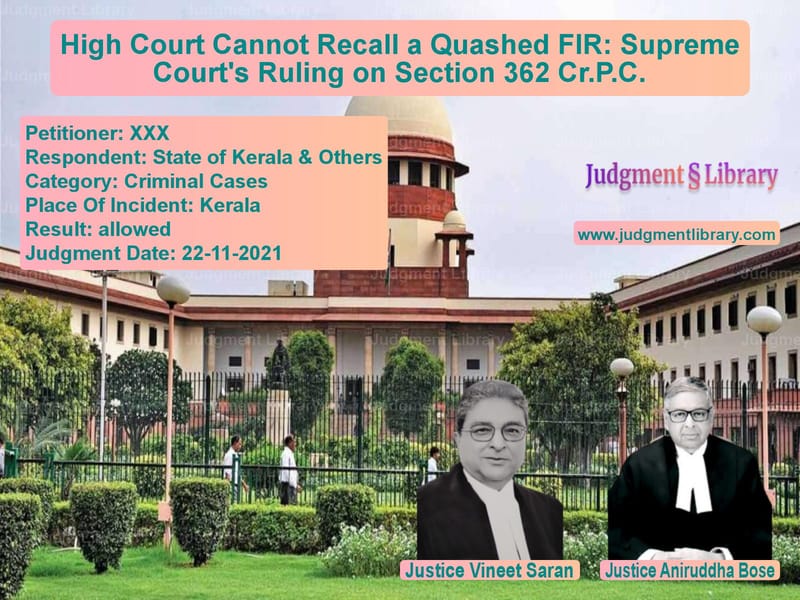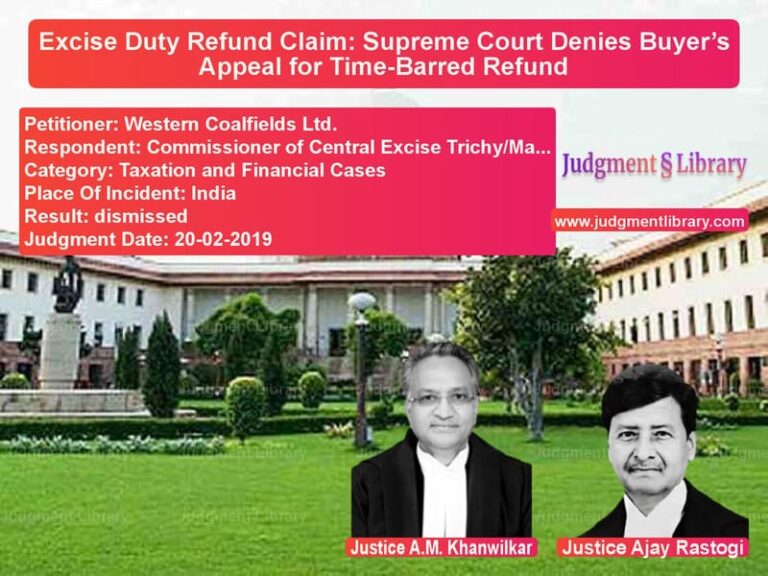High Court Cannot Recall a Quashed FIR: Supreme Court’s Ruling on Section 362 Cr.P.C.
The case of XXX vs. State of Kerala & Others deals with the legal question of whether a High Court can recall an order quashing an FIR under its suo moto powers. The Supreme Court had to determine if the Kerala High Court acted beyond its jurisdiction when it took up the matter on its own motion and recalled its previous order quashing an FIR.
Background of the Case
The appellant had filed a petition before the Kerala High Court under Section 482 of the Code of Criminal Procedure (Cr.P.C.), challenging an FIR lodged by the respondent. The High Court, after hearing both parties, quashed the FIR by a reasoned judgment dated 20th April 2021.
However, on 28th April 2021, the High Court took up the matter suo moto and recalled its own order quashing the FIR. The appellant challenged this action before the Supreme Court, arguing that the High Court had no power to recall its order after final disposal of the case.
Arguments by the Petitioner (XXX)
- The petitioner argued that under Section 362 Cr.P.C., a criminal court has no power to alter or review a judgment once it has been signed, except for correcting clerical or arithmetical errors.
- The High Court had already passed a detailed order quashing the FIR on merits, and recalling such an order was beyond its jurisdiction.
- The recall of the order was done suo moto, without any application from any party, making it legally unsustainable.
- The principles of finality in criminal proceedings must be upheld to prevent judicial overreach.
Arguments by the Respondents (State of Kerala & Others)
- The respondents contended that the High Court acted in the interest of justice when it recalled its order.
- They argued that in exceptional circumstances, the High Court has inherent powers under Section 482 Cr.P.C. to recall an order if it is found to have been passed without proper consideration.
- The respondents maintained that the High Court did not pass a fresh order on merits but only revived the original FIR for further investigation.
Supreme Court’s Observations
The Supreme Court bench, comprising Vineet Saran and Aniruddha Bose, analyzed whether the High Court’s action was legally permissible under the provisions of the Code of Criminal Procedure.
The Court categorically held:
“In view of Section 362 Cr.P.C., the Court does not have the power to alter the judgment and order once passed, except to correct a clerical or arithmetical error. The impugned order dated 28.04.2021 could not have been passed, and the earlier order dated 20.04.2021 has wrongly been recalled by the High Court.”
The Supreme Court emphasized that:
- The prohibition under Section 362 Cr.P.C. is absolute, except for correcting clerical or arithmetical errors.
- Once an order quashing an FIR has been passed after due consideration, it cannot be reopened on the court’s own motion.
- The High Court’s recall of its previous order was without jurisdiction and contrary to settled legal principles.
Key Precedents Cited
The Supreme Court referred to the following judgments:
- Mohd. Afzal vs. State of Haryana (1996) 7 SCC 397: Held that the High Court cannot recall a judgment once it has been signed.
- State of Punjab vs. Davinder Pal Singh Bhullar (2011) 14 SCC 770: Reiterated that Section 362 Cr.P.C. prohibits modification of a judgment except for clerical errors.
- R. Rajeshwari vs. H.N. Jagadish (2008) 4 SCC 82: Established that criminal courts do not have review powers except as expressly provided in the statute.
Final Judgment
The Supreme Court ruled that:
- The High Court’s order dated 28th April 2021 recalling its previous judgment was legally unsustainable.
- The recall order was set aside, restoring the quashing of the FIR.
- The appeal was allowed in favor of the petitioner.
Impact of the Judgment
The ruling has significant implications for criminal jurisprudence:
- Strict Application of Section 362 Cr.P.C.: Courts cannot review or alter final judgments except for clerical errors.
- Judicial Finality: The judgment upholds the principle that once a criminal court decides a matter, it cannot be reopened on the court’s own motion.
- Preventing Judicial Overreach: The decision serves as a safeguard against arbitrary reopening of cases by High Courts.
Conclusion
The Supreme Court’s ruling in XXX vs. State of Kerala is a reaffirmation of the principle that criminal courts lack the power to recall final judgments. The judgment strengthens legal certainty and prevents unwarranted judicial interference after a matter has been decided on merits. This case sets an important precedent for the application of Section 362 Cr.P.C. and ensures that courts adhere to the doctrine of finality in criminal proceedings.
Petitioner Name: XXX.Respondent Name: State of Kerala & Others.Judgment By: Justice Vineet Saran, Justice Aniruddha Bose.Place Of Incident: Kerala.Judgment Date: 22-11-2021.
Don’t miss out on the full details! Download the complete judgment in PDF format below and gain valuable insights instantly!
Download Judgment: xxx-vs-state-of-kerala-&-ot-supreme-court-of-india-judgment-dated-22-11-2021.pdf
Directly Download Judgment: Directly download this Judgment
See all petitions in Bail and Anticipatory Bail
See all petitions in Fraud and Forgery
See all petitions in Extortion and Blackmail
See all petitions in Judgment by Vineet Saran
See all petitions in Judgment by Aniruddha Bose
See all petitions in allowed
See all petitions in supreme court of India judgments November 2021
See all petitions in 2021 judgments
See all posts in Criminal Cases Category
See all allowed petitions in Criminal Cases Category
See all Dismissed petitions in Criminal Cases Category
See all partially allowed petitions in Criminal Cases Category







